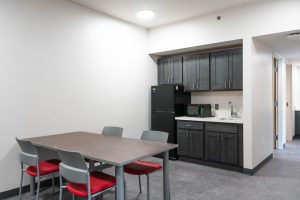Budget Cuts Delay DeCafé’s Opening Time
An Oberlin student pours coffee in DeCafé. To save money for the College, DeCafé now opens at 11 a.m. instead of 9 a.m. on weekdays.
September 2, 2016
At 9:20 a.m. on Tuesday, Conservatory junior Kat Chavez tried to open the DeCafé door to buy some oatmeal.
The door didn’t budge. She was shocked to find DeCafé now opens two hours later on weekdays than in past semesters.
“I’m hungry,” Chavez said. “I just wanted some breakfast.”
The change in hours may prove the first of budget cuts to come. The Finance Department has recently asked all divisions of the College to try to find savings wherever possible.
“All divisions of the College have been asked to review their programs to look for opportunities to reduce costs with minimal impact,” Finance Director Mike Frandsen wrote in an email to the Review. “The cutbacks are targeted in that we are trying to make choices that have the least impact and are consistent with priorities.”
According to Director of Dining Services Michelle Gross, CDS reduced DeCafé’s hours to comply with Frandsen’s request.
“Campus Dining was open for breakfast at three locations: Dascomb, Science Cart and Wilder,” Gross wrote in an email to the Review. “Based on the number of students being served, it was reasonable to consider a reduction in operating locations at breakfast, and the fewest number of students were eating at Wilder.”
While the exact extent of the budget cuts is unclear, the overall message is not: The College is looking to save money in any way it can.
For Interim Dean of Students Meredith Raimondo — who oversees everything from ResEd to the class deans to Safety and Security — that means considering every personnel decision very carefully from a financial perspective.
“Our primary activity right now is to look at the staffing of the various divisions of student life and to say, are there any places, especially as retirements come up, where we can think about either eliminating positions, restructuring and looking for opportunities to save money.”
For years, the school raised tuition by 4 percent every spring. This year, however, the College raised tuition by only 2.8 percent. The College receives the majority of its revenue from tuition.
“If revenue isn’t going to grow, then cost has to go down,” Raimondo said. “The only way cost can continue to rise is if revenue goes up. It’s just basic math on some level.”
Politics department Chair Chris Howell emphasized that the current budget squeeze derived primarily from the decision to reduce tuition growth.
“The reason why we have budget deficits escalating out into the future is because of the decision to reduce our revenue in key areas. It’s not because we were living beyond our means 12 months ago. … If we don’t stop doing some things that we’re doing now, the only way in which we can make the cuts to deal with those deficits is through personnel — firing people, paying people less or giving people less benefits — or all three,” Howell said.
As administrators throughout the College try to save in various ways, the College is also considering larger strategic cuts through the Strategic Plan Implementation, although which programs will receive cuts — and how extreme the cuts will be — remains to be seen.
“The College has to be in a different habit about how it manages its finances in an ongoing way, and so it will be a lot of small ongoing decisions about how we think,” Raimondo said. “Every time we make a new hire in any position, anywhere in the College, we have to ask: is this mission critical? And if it is, we’ll do it. And if it’s not, we rethink it.”
Last spring, the College offered a year’s salary to employees who retired early. Ninetyeight employees and 30 percent of those eligible took the deal, according to The Source. To qualify, employees had to be 52 or over, have worked at the College for at least 10 years and have their age and length of employment total over 75.
“Employee groups participating (and the number of participants in each) are faculty (15), administrative and professional staff (29), Oberlin College Office and Professional Employees (32), United Auto Workers (21), andSafetyandSecurity(1),”TheSourcewrote.
By encouraging older employees to retire, the College can save money by either replacing them with younger (and thus cheaper) workers, combining positions or choosing not to replace departing staff.
The College expects to save between $2.5 million and $3.5 million each year. According to Frandsen, it’s “not likely” that the College will offer more buyouts any time soon.
For what it’s worth, Raimondo stated that as part of an effort to improve the quality of its breakfast offerings, the Science Cart now offers oatmeal.


























